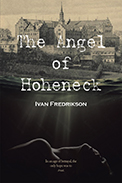
 |
Janek Dabrowski’s devotion to Armia Krajowa—the primary Polish resistance movement—does not go unnoticed by his superiors. Despite his prestige and promotion through the ranks, the darkness of self-hatred that surrounds his heart and his alcohol addiction lead him astray. A Jew, he fights for Poland during the war, but Poland's Russian Bolshevik liberators are as intolerant of Jews as the German fascists. He assumes a Russian identity, Yakov Nowak, and joins the Ministry of Public Security (MBP), the secret police group that purges all anti-communist sentiment from Poland. This includes the persecution of the soldiers of the Armia Krajowa.
Six decades of violence wrought by Yakov’s deception, addiction, and dark rage lay ahead, with cruel repercussions for the women who love him and even for his beloved son, Karl. Born in the Hoheneck Fortress, a twelfth-century castle where female political prisoners are held, Karl is brought to Yakov by a nurse, Katja, the titular angel of Hoheneck, who becomes the only mother Karl knows. As Karl matures and rejects his father’s lifestyle, he still must grapple with the epigenetic shadow of his ancestry for years to come.
Sierżant (Sergeant) Janek Dabrowski’s resistance during the Nazi occupation of Poland in World War II spurs an unending obsession for revenge in this riveting, fast-paced historical thriller. The novel is impressive for the generations-long narrative that ties many characters to one unfortunate man’s decades of suffering and brutality. The life and death stakes in the tale are intense, and readers may find the violence triggering or, conversely, may find it difficult to stop reading as the protagonist's life unravels amidst intriguing twists and turns. Readers unfamiliar with the specifics of Polish history during and after World War II will emerge educated as well as entertained by this well-researched, complex tale.
RECOMMENDED by the US Review